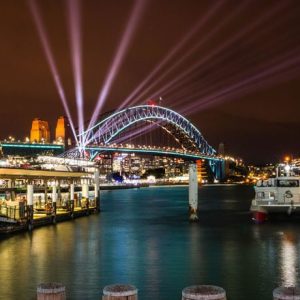
ITS Monday: Edition 35, 2024

ITS Monday is a small, weekly collection of curated content from the worlds of intelligent transport systems, smart mobility, and associated areas.
Included this week, e-scooter and the circular economy, Sydney transport trends, emission-free ferries, Tasmania cycling boost, and more.
The article headlines below are:
- What the e-scooter ban tells us about Australia’s circular economy
- Sydney’s traffic paradox: More cars, less traffic
- Revealed: How the new metro line has shaken up Sydney’s commutes
- Sydney Harbour ferries to be replaced by emissions-free vessels over next decade
- Tasmanian Walk, Wheel, Ride Guidance: Cycling infrastructure Design
- Qld Gov launches e-bike subsidies
iMOVE National R&D Conference 2024
The dates are fast approaching for our big R&D conference, being held this time in Brisbane. Click the banner below for more information, and to register.
This week’s articles
Now, scroll down, and see what’s in this week’s edition. Oh, and before you do, be sure check out the quickest way to receive our new content via the subscription box just below …


What the e-scooter ban tells us about Australia’s circular economy
An article co-authored by Kebir M. Jemal, Associate Professor Ajibade Aibinu and Dr Mehran Oraee, all of the University of Melbourne.
“Melbourne’s ban is an important reminder that in order for emerging circular business models to be successful and sustainable, fundamental needs of customers and the community – like, in this case, safety – must be prioritised. So what does the ban tell us about the viability of circular business models in Australia, and could it ultimately hinder the country’s transition to a circular economy?”
Related iMOVE articles:
Related iMOVE projects:
- OneDock: Supercharging e-micromobility
- Road use activity data: Cyclists, pedestrians and micromobility
- Impacts of eRideables on the transport task in WA

Sydney’s traffic paradox: More cars, less traffic
“Sydney’s most congested roads are choking on significantly less traffic than five years ago, despite record car and driver registrations, and millions fewer public transport trips each month.” Interviewed for this article is the University of Sydney’s Institute of Transport and Logistics Studies‘ Professor David Hensher, speaking as to how working from home had reshaped the city’s road use.
Related iMOVE articles:
- Working from Home: Info, Projects & Resources
- Prospects for Working from Home: Assessing the evidence

Revealed: How the new metro line has shaken up Sydney’s commutes
Staying on the topic of transport change and trends in Sydney, the new Metro line is encouraging more people to ditch the car for public transport while easing pressure on busy heavy rail stations, which have had falls of up to 40 per cent in commuters passing through ticket gates.
“While entries and exits at North Sydney station fell considerably, the combined numbers for it and Victoria Cross show that thousands more people chose heavy rail or metro to travel to and from their destination – a trend that was replicated at stations in the central city.”
READ THE ARTICLE
Sydney Harbour ferries to be replaced by emissions-free vessels over next decade
NSW Transport Minister Jo Haylen confirmed the government is working to fully replace within the next 11 years the current diesel-powered vessels on the busy Manly route with electric or hydrogen boats.
READ THE ARTICLE
Tasmanian Walk, Wheel, Ride Guidance: Cycling infrastructure Design
“This is the first Tasmanian Cycling Infrastructure Design Guide. This guide has been developed to support the design of infrastructure that enables more people to cycle. The guide draws on national and international best practice and some of the concepts introduced are new to Tasmania. The Department of State Growth is seeking to support practitioners and stakeholders with new designs to enable more Tasmanians to ride.”
Related iMOVE projects:
- Safer cycling and street design: A guide for policymakers
- Road use activity data: Cyclists, pedestrians and micromobility
- Modelling cycling investments in regional areas

Qld Gov launches e-bike subsidies
“Queenslanders will be able to access a $500 subsidy to purchase e-bikes. The million-dollar E-Mobility Rebate Scheme will enable up to 1,600 (up to 1,600 discounted e-bikes if used claimed exclusively for just e-bikes) Queenslanders to access e-bikes for transport, health and recreation.”
READ THE ARTICLEDiscover more from iMOVE Australia Cooperative Research Centre | Transport R&D
Subscribe to get the latest posts sent to your email.



